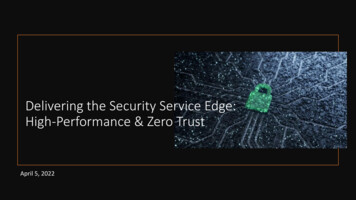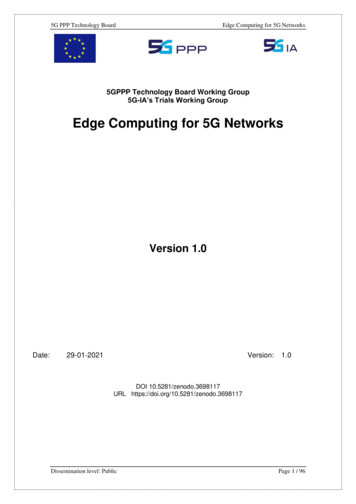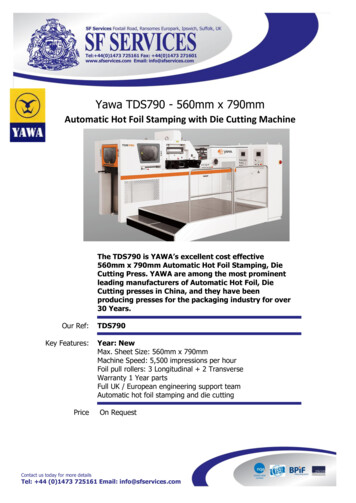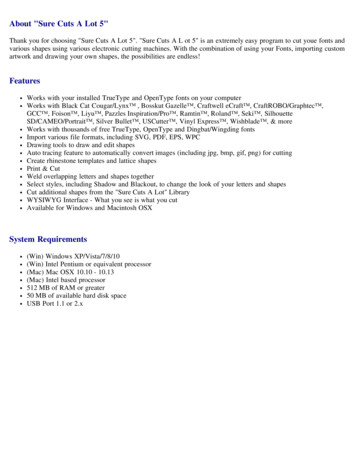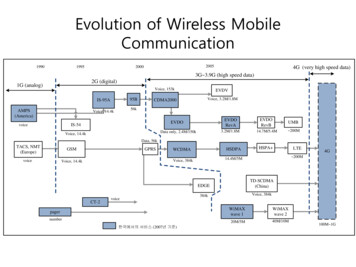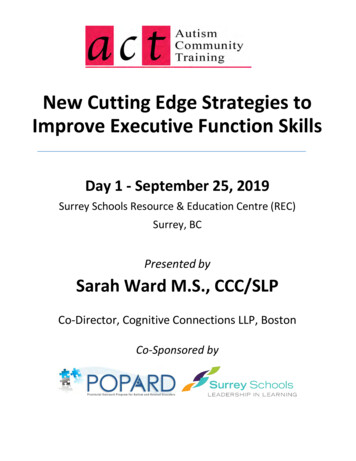
Transcription
New Cutting Edge Strategies toImprove Executive Function SkillsDay 1 - September 25, 2019Surrey Schools Resource & Education Centre (REC)Surrey, BCPresented bySarah Ward M.S., CCC/SLPCo-Director, Cognitive Connections LLP, BostonCo-Sponsored by
Event Schedule8:009:0010:2010:4012:0012:402:002:20– 9:00– 10:20– 10:40– 12:00– 12:40– 2:00– 2:20– 3:30RegistrationSession 1Morning BreakSession 2Lunch BreakSession 3Afternoon BreakSession 4Tips for Improving the Conference Experience Please turn off your cell phones or put them on vibrate. In respect for the speakers and fellow participants, pleasedo not whisper. This workshop is being web streamed to an onlineaudience. Please ask questions using a microphone so thatall can hear. Personal recording of any kind is strictly forbidden. Please secure your belongings! ACT cannot takeresponsibility for theft. Many of your fellow participants require a scent-freeenvironment. Please be considerate. For your comfort, dress in layers. It may be a warm day butbring a sweater just in case!
AcknowledgementsThose who have attended ACT – Autism Community Training’s events over the years know that wedepend on community collaboration and support to sustain our work. Our volunteers and fundersmake it possible for us to provide cost-effective training in-person, via web streaming and online video.ACT’s volunteers range from parents and community groups, who advise us on venues and speakers,to ACT’s membership, including our Board of Directors, who provide a range of expertise, as well asthose who volunteer at our events. Their contributions are all essential to ACT’s work.This event has been made possible thanks to the support of the Surrey School District and to theProvincial Outreach Program for Autism and Related Disorders. We are very grateful for thiscollaboration which has allowed us to web stream to 21 school districts across BC from Surrey SchoolDistrict’s excellent facilities. Our thanks to ODIN Books for continuing to support our bursary program.ACT provided 23,000 in bursary funding in 2018 in the form of reduced registration fees.Special thanks to Sarah Ward for returning to British Columbia to present for ACT. Ms. Ward’s twoday presentations provide practical resources and techniques that enable parents and teachers totackle the challenges of executive function for those with autism and related conditions.Free Resources from ACTAutism Videos @ ACT (AVA) – Over 50 quality online videos available free – without a log-in,thanks to our sponsors. www.actcommunity.ca/videosACT’s Autism Information Database (the AID) – Like Google for Autism but better!Keyword search nearly 1,500 curated AID records for evidence-informed, practical informationresources useful to families and community professionals. www.actcommunity.ca/aidACT’s BC Community Resources Database – Search by your postal code for professionals andservice providers throughout BC. www.actcommunity.ca/aid-search/communityACT’s Autism Manual for B.C – 13 chapters! www.actcommunity.ca/autism-manual-for-bc ACT’s Monthly News Round-Up & Event Alerts - Sign-up to keep in touch with developmentsaffecting the special needs community www.actcommunity.ca/updatesACT’s Facebook - ACT carefully sources interesting, insightful stories to inform our 6,000 plusfollowers. www.facebook.com/autismcommunitytrainingACT – Autism Community TrainingSuite 204– 2735 East Hastings Street, Vancouver, BC, V5K 1Z8 Tel: 604-205-5467Toll-Free: 1-866-939-5188 Fax: 604-205-5345Email: info@actcommunity.ca Website: www.actcommunity.ca
Executive Function Vocabulary1
Learn it Today, Use it Tomorrow! Effective Interventions for Improving ExecutiveFunction Skills for Children/Students“Let’s see, I can writeabout Lauren’s birthday party. Itwas so fun! I need an introsentence and a few details aboutwhat we did. I need “expensiveadjectives”. The Piñata was somuch Fun! Lauren got a cool newbackpack. I want one like that!Cutting Edge Strategies to ImproveExecutive Function SkillsSarah Ward, M.S., CCC/SLPSpeech and Language PathologistKristen Jacobsen, M.S., CCC/SLPSpeech and Language PathologistCognitive Connections, LLP747 Main Street, Suite 307Concord, MA 01742978‐369‐5200 www.efpractice.com“Oh. I can’tremember what I didthis weekend.What am I going towrite about?This is going to takeforever .”360 Thinking Cognitive Connections, LLP www.efpractice.com Copyright September 2019, Kristen Jacobsen, M.S., CCC/SLP & Sarah Ward, M.S., CCC/SLP.All Rights Reserved.209/25/2019
Learn it Today, Use it Tomorrow! Effective Interventions for Improving ExecutiveFunction Skills for Children/Students09/25/2019Role/Order of Working Memory in Executive Function SkillsVerbal Working MemorySelf Talk/ Stated Intentions“I will, I am going to, Maybe Ishould, When I ”If thenVerbalWorkingMemory(Self Talk)NonverbalWorkingMemoryIf thenSituational Awareness/IntelligenceNon Verbal Working Memory and Early Self RegulationSTOP and Read the RoomNonVerbal Working Memory: Visually Holding information in your mind whilementally working with it or updating it Critical for anything that unfolds over timeSpaceTimeObjectsPeopleNavigate the RoomGet on the TimelineOrganization/ObjectsRead the Person: ROLE Time of day Kind of time? What is happening atthis Moment in Time Sequence of actions Pace What is coming up? Predictable? Organization ofThe Space: Whole‐Parts How is that partorganized? Location of objects:In sight? Out of sight? Purpose/Priority ofobjects? Necessity & Relevancy Kind of space? What's going on? Is it Expected orUnexpected? Pathways used toNavigate to differentareas within the space? Is there a shiftbetween wide anglelens of thespace(Whole), thezones (parts) and thedetails?Enables you to demonstrate Inhibitory/Self Control: since you ‘see’ what you needto be doing you are more able to resist the strong inclination to do something else Attention – resist distractions Emotion ‐ resist giving up Behavior – resist impulse to do an actionthat is inappropriatePlanning: emergence of cause and effect andmeans to an end: “if .then .” FaceBodyAppearanceMoodPaceSaying‐Tone360 Thinking Cognitive Connections, LLP www.efpractice.com Copyright September 2019, Kristen Jacobsen, M.S., CCC/SLP & Sarah Ward, M.S., CCC/SLP.All Rights Reserved.3
Learn it Today, Use it Tomorrow! Effective Interventions for Improving ExecutiveFunction Skills for Children/StudentsLibraryLibrarian ZoneSTOP and Read the RoomEasy Reader BooksSpaceLibrarianFact udents Seated on the RugStudent ZoneOrganized Thinking andSpeed of InformationProcessingNeurotypicalASD360 Thinking Cognitive Connections, LLP www.efpractice.com Copyright September 2019, Kristen Jacobsen, M.S., CCC/SLP & Sarah Ward, M.S., CCC/SLP.All Rights Reserved.4
Learn it Today, Use it Tomorrow! Effective Interventions for Improving ExecutiveFunction Skills for Children/Students09/25/2019Situational Awareness Nonverbal Working MemorySituational IntelligenceMimetic‐Ideational Information Processing(mental trial and error simulation) An early aspect of executive function skills is situational intelligence(reading the room) – This is recognizing zones in the room – space, time, objects, people – in aself directed way. It is self‐directed, because the student is answering What do I need to do? What is expected of me in this setting? It involves self‐directed observation What’s happening now? What matters now? It is “IF then” thinking. if this is what it looks like, then what do I need to do?Episodic/Autobiographical MemoryMemory for autobiographical events (Contextual )you can explicitly re‐experience: Mimetic Ideational Information Processing Places (Spaces)TimesObjectsPeopleEmotionsFeatures of Past Episodic Memory Knowing vs Remembering Knowing is more factual (semantic) i.e. Knowing what a wedding is Remembering is a feeling that is locatedin the past (episodic) i.e. Re‐experiencing the wedding youattended last summer Autonoetic Consciousness Sense of subjective (emotional) self intimeBeing a “Mind Mime”‐ Mime the Idea in Your HeadMental Pre‐Simulation of How the Future Will Play OutIt is a Mental Dress Rehearsal A Mental Trial and Error without the Risk of ErrorYou can try it out and Pre‐ Experience the Emotion of a SituationWithout Risk You can Run Plan A and Plan B and Pre‐ExperienceHow Those Feel360 Thinking Cognitive Connections, LLP www.efpractice.com Copyright September 2019, Kristen Jacobsen, M.S., CCC/SLP & Sarah Ward, M.S., CCC/SLP.All Rights Reserved.5
Learn it Today, Use it Tomorrow! Effective Interventions for Improving ExecutiveFunction Skills for Children/Students09/25/2019Be a Future Thinker: “Mind MIME iT’MIMEiTFuture Scene Thinking: Make an Image: STOP What will it look like?Episodic Future Thinking: What do I Look like? Self Projection into the FutureMental Time Travel (Temporal ‐ Spatial ): How am I Moving to achieve this?The Future Emotion: How will I feel? Emotional Physiological State90% of the TimeTask Planning Happens in aDifferent Space fromWhere you Execute the PlanIf .thenSelf TalkIt is ‘experiencing the self in time’ and talking yourself through that experienceso you are efficient and successfulNonverbal Working Memory Situational Intelligence Bedtime RoutineSpaceTime“In My Bedroom! In my Bed”“Quick! After watching Blues Clues!”ObjectsPajamas! Book! Bear!PeopleI’ll brush my hair and teeth! Daddy will be areader!Mimetic‐IdeationalInformation Processing(mental trial and error simulation)The Situational Intelligence Shiftsfrom Now to Next Self Regulation360 Thinking Cognitive Connections, LLP www.efpractice.com Copyright September 2019, Kristen Jacobsen, M.S., CCC/SLP & Sarah Ward, M.S., CCC/SLP.All Rights Reserved.6
Learn it Today, Use it Tomorrow! Effective Interventions for Improving ExecutiveFunction Skills for Children/Students09/25/2019Check your Understanding. What does MIME iT stand for?MIM“Time for Math!Let’s get ready!You will need lastnight’s homework,your math journaland the fractionmanipulatives!”EiT“Not Much”Science Chap3and Q’s 1-6“I hate HW”Spanishchap 5Math readchap 2FinishPoster360 Thinking Cognitive Connections, LLP www.efpractice.com Copyright September 2019, Kristen Jacobsen, M.S., CCC/SLP & Sarah Ward, M.S., CCC/SLP.All Rights Reserved.7
Learn it Today, Use it Tomorrow! Effective Interventions for Improving ExecutiveFunction Skills for Children/Students09/25/2019Develop the Extended Time and Space HorizonHow Far Into the Future Can You See?Both Time and SpaceScience Chap3and Q’s 1-6Spanishchap 5Math readchap 2FinishPosterTemporal – SpatialCapacity/WindowElementary school: ‘Now and Next’ &External RegulationDevelopment of the Time HorizonHow Far into the Future can they Anticipate?2 Years Old: NOW3‐5 Years Old: 5‐20 MinK‐ 2nd Grade: Several Hours3rd ‐6th Grade: 8‐12 Hours6th‐12th Grade Years : 2‐3 Days17‐23 Years Old : 2‐3 Weeks23‐35 Years Old: 3‐5 WeeksTemporal – Spatial Capacity/WindowADHD EFDD: Executive Function Developmental Delay‐ Typically of the Spatial Temporal WindowAverage of a 3 to 3.5 year delay360 Thinking Cognitive Connections, LLP www.efpractice.com Copyright September 2019, Kristen Jacobsen, M.S., CCC/SLP & Sarah Ward, M.S., CCC/SLP.All Rights Reserved.8
Learn it Today, Use it Tomorrow! Effective Interventions for Improving ExecutiveFunction Skills for Children/StudentsMiddle and High School Students: Internal RegulationMore Complex Because of the Temporal Spatial WindowSTOP09/25/2019Plan Backwards (Plan My Work)3. Get Ready2. Do1. DoneWhat Materialswill I need?What do I Need to do toMatch the Done Picture?How long will each steptake? Move /Sequence?Make and Image:What will it/I Look Like?MIME iTTuesdayPlan Backwards (Plan My Work)Why is it Problematic to Start with Get Ready?STOP3. Get Ready2. Do1. DoneWhat Materialswill I need?What do I Need to do toMatch the Done Picture?How long will each steptake? Move /Sequence?Make and Image:What will it/I Look Like? It Starts At Task Executing and Bypasses Planning Does not Provide the Opportunity for Self Monitoring Provides the Task (Poster Due) but NOT the Cueo “When I am at home tonight (space & time) I will get posterboard (objects) from the closet and have mom helpme(people) find some old photos for it” Most Important: Does not Support Nonverbal Working MemoryMIME iTSelf MonitorExecute Forwards (Work My Plan)Get ReadyWhat Materialswill I need?DoneStop, Clean Up,Review6. Stop360 Thinking Cognitive Connections, LLP www.efpractice.com Copyright September 2019, Kristen Jacobsen, M.S., CCC/SLP & Sarah Ward, M.S., CCC/SLP.All Rights Reserved.9
Learn it Today, Use it Tomorrow! Effective Interventions for Improving ExecutiveFunction Skills for Children/Students09/25/2019Executive FunctionsTask PlanningFuture ImageTask PlanningSelfMonitoringTask ExecutingSelf Monitoring Plan Initiate Self‐monitor Sequence Inhibit Problem Solve Prioritize Pace Emotional control Organize Complete ShiftTask ExecutingThe Development ofExecutive Function SkillsThe Development ofExecutive Function Skills?“Play with electronic toys is associated withdecreased quality of language input comparedwith play with books and traditional toys”Carol Westby Children vocalize less Fewer conversational turns Fewer production of content specificwords360 Thinking Cognitive Connections, LLP www.efpractice.com Copyright September 2019, Kristen Jacobsen, M.S., CCC/SLP & Sarah Ward, M.S., CCC/SLP.All Rights Reserved.10
Learn it Today, Use it Tomorrow! Effective Interventions for Improving ExecutiveFunction Skills for Children/StudentsInteractive vs Character Toys09/25/2019Think & Play the SocialScouts Way :Firefighter Leo to theRescue! Play was Purely Functional Push the buttons Switch on and Off No attention to accessories Shoved the food down the bird’s throat: no pretendfeeding No sense the duck was hungry and “I am feeding it” Never took the role of the duck No statement on behalf of the duck Only talked about the toy’s actions (It’s off) No sign of imagination, imaginary situations No Play storylines unless facilitated by an adulthttps://socialscoutsla.comSmimova, E. O. (2011). Character toys as psychological tools. International Journal of Early Years Education, 19, 35‐43.70 Play Activities for BetterThinking, Self Regulation,Learning and BehaviorMake Play R.O.C.K. Booklet SeriesIf you have a young child with autism, you may have noticed that he has difficultylearning to play. His play may be less flexible or creative than that of other children,and it may rarely involve other people.The Make Play R.O.C.K. booklet series gives you practical, research-basedstrategies for expanding your child’s play skills during everyday play activities. You’lllearn powerful ways to get involved in your child’s play and help him learn whilehaving fun together. After all, fun is what play is all about!by Lynne Kenney and Rebecca Comizio360 Thinking Cognitive Connections, LLP www.efpractice.com Copyright September 2019, Kristen Jacobsen, M.S., CCC/SLP & Sarah Ward, M.S., CCC/SLP.All Rights Reserved.11
Ages 8-11Inhibit behaviors; follow safety rules, use appropriate language (e.g. not swearing or using bath- ‐room language when not appropriate), raise hand before speaking in class, and keep hands toself.Decide how to spend their money.Complete homework assignments (20-minutes maximum).Bring papers to and from school.Ini ate and perform simple chores and self-help tasks, but may need reminders; making theirbed, make a bowl of cereal.Tidy bedroom or playroom independently.Complete 2-3 step errands; “Put the napkin in the trash and then bring me a cup.”5-7 Year OldsInhibit unsafe or inappropriate behaviors; don’t touch a hot stove; don’t run into the street;don’t grab a toy from another child; don’t hit, bite, push, etc.Perform simple chores and self-care tasks with reminders and physical assistance if needed;clear dishes from table, brush teeth, get dressed.Clean and put items away with minimal assistance.Complete simple errands; “Get your shoes from the bedroom”.3-4 Year OldsExecu ve Func oning Skills Check-ListStudent: Chronological Age/Grade: Executive Function Age: Run errands, including those involving a me delay, such as remembering to bring somethinghome from school without reminders.Perform chores that take 10-30 minutes; se ng the table, dus ng.Bring books, papers, assignments to and from school.Keep track of belongings when away from home.Complete the majority of homework assignments without assistance (1 hour maximum).*Adapted From: Dawson, P. and Guar, R. Execu ve Skills in Children and Adolescents. New York: The Guilford, 200412
nued)Execu ve Func oning Skills Check-ListAges 8-11 (conPlan simple school projects such as book reports; select book, read book, write report.Remember changes in daily schedule including different a er school ac vi es.Save money for desired objects and plan how to earn money.Inhibit/self-regulate behaviors; maintain composure when teacher is out of the classroom; inhib- ‐it temper tantrums and bad manners.Able to safely baby-sit younger siblingsHelp out with chores around the home, including both daily responsibili es and occasional tasksthat may take 60-90 minutes to complete; emptying dishwasher, raking leaves, shoveling snowetc.Ages 12-14Appropriately use a system for organizing school workIndependently follow complex school schedule involving mul ple transi ons with teachers andclassrooms.Plan and carry out long-term projects, including tasks to be accomplished and a reasonable me- ‐line to follow;Plan me effec vely, including a er school ac vi es, homework, family responsibili esInhibit rule breaking in the absence of visible authority.High SchoolManage schoolwork effec vely on a day-to-day basis, including comple ng and handing in as- ‐signments on me, studying for tests, and crea ng and following melines for long-term projects.Establish and refine a long-term goal and make plans for mee ng that goal; collegiate or othervoca onal goals.Independently organize leisure me ac vi es, including obtaining employment or pursuing rec- ‐rea onal ac vi es during the summer.Avoid reckless or risky behaviors (e.g. use of illegal substances, sexual ac ng out, shopli ing, orvandalism).*If your child demonstrates difficulty in 2 or more of the above areas for their age, it is recommended that you contact an exec- ‐u ve func oning specialist to further iden fy execu ve func oning needs and create strategies to address those needs.Created by:North Shore Pediatric TherapyPhone: (877) 486-4140 Email: info@NSPT4kids.comwww.NSPT4kids.com 2011, North Shore Pediatric Therapy, Inc. All Rights Reserved. Do not reproduce or republish without the express wri enconsent of North Shore Pediatric Therapy, Inc.13
Learn it Today, Use it Tomorrow! Effective Interventions for Improving ExecutiveFunction Skills for Children/Students09/25/2019The Get Ready *Do *DONE MethodPlan Backwards to Move ForwardsStage 1: Task PlanningThe Behavior Code by Jessica Minnahan and NancyRappaport, MDAll Behavior is a Form of Communication Attention Escape/AvoidPlanning Time Gain a Tangible Object Gain Sensory SatisfactionThe Get Ready *Do *DONE MethodPlan Backwards to Move ForwardsStage 2: Task ExecutionGet ReadyDoDoneMonitoringTimeSTART WITH THE DONEGet Done4. Start: What materials do Ineed to do the steps?Prepare my Space5. Check: Sketch the time,create time markers and ½ waycheckpoint. Set timer to alert ½way point. Do My Work! Check inat the ½ way point andDetermine if there are any timeRobbers:Identify/Remove/Replan6. STOP: Know when to STOP.Close out the Task.Review: What Worked? Whatdid not Work?Developing Independent Executive Function Skills360 Thinking Cognitive Connections, LLP www.efpractice.com Copyright September 2019, Kristen Jacobsen, M.S., CCC/SLP & Sarah Ward, M.S., CCC/SLP.All Rights Reserved.14
Learn it Today, Use it Tomorrow! Effective Interventions for Improving ExecutiveFunction Skills for Children/Students09/25/2019“Time to go! Are you ready for school?”Representational Co‐thought GestureBe a Future Thinker: “Mind MIME iT”We Gesture to Pre‐ Experience Mental Spatial Time TravelSelf Talk – Stated Intentions“I will .I am going to Co thought gestures are really just an outgrowth of how wementally simulate planning (performing actions to go from thefirst to the final step) Gestures give life to our mental scratch pads, allowing us toperform actions with our hands before we have to do them inreal life or before we have even thought these activities all theway through to put them into words Gesture helps infuse planning with an emotional charge tomake the memory for it more enduringIf .thenElement of UncertaintyMaybe .I could .”Gesture enables us to ‘pre‐experience’ the mental spatial time travel and actionsof the future so we can ‘experience the self in time’ and then talk ourself throughthat experience to be efficient and successful360 Thinking Cognitive Connections, LLP www.efpractice.com Copyright September 2019, Kristen Jacobsen, M.S., CCC/SLP & Sarah Ward, M.S., CCC/SLP.All Rights Reserved.15
Learn it Today, Use it Tomorrow! Effective Interventions for Improving ExecutiveFunction Skills for Children/Students“Get Ready for School!Show and Tell Me Your Plan!”Role/Order of Working Memory in Executive Function SkillsGet ReadyDoUgh.it’s 7:15 (time). I needto go upstairs(space) andquickly brush my hair andget dressed (time andpace). My lunch is on thekitchen counter (space). Ineed to remember to putmy book in my backpack.09/25/2019DoneIf .ThenCreating Episodic Future Memoryvs Cueing Semantic RecallDevelop NonVerbal Working Memory for Goal Directed Future ThinkingStart with the Done to:– Teach “Thinking in Pictures”– Develop Whole to Part to Details Thinking (OODA Loop)– Teach Flexible Thinking– Develops Gesture for Mental Spatial Time Travel– Develops Stated Intentions: I will, I am going to, Maybe, I could360 Thinking Cognitive Connections, LLP www.efpractice.com Copyright September 2019, Kristen Jacobsen, M.S., CCC/SLP & Sarah Ward, M.S., CCC/SLP.All Rights Reserved.16
Learn it Today, Use it Tomorrow! Effective Interventions for Improving ExecutiveFunction Skills for Children/Students09/25/2019Role/Order of Working Memory in Executive Function Skills“Let’s get ready to go home!”Get ReadyDoYayy it’s 3:00 (time). I needto go to my cubby(space)and quickly pack myhomework folder in mybag(time and space). Mylunch is on the topshelf(space). I need toremember to bring myshare bag home(space).Semantic vs Episodic MemoryDoneIf .then .To Improve OrganizationUse Feature Blocking:Add “Block and Box” to “What will it Look Like”Organized Thinking andSpeed of InformationProcessingWholeBea FeatureTeacher!Parts(features)Details360 Thinking Cognitive Connections, LLP www.efpractice.com Copyright September 2019, Kristen Jacobsen, M.S., CCC/SLP & Sarah Ward, M.S., CCC/SLP.All Rights Reserved.17
Learn it Today, Use it Tomorrow! Effective Interventions for Improving ExecutiveFunction Skills for Children/Students09/25/2019Make an Image ‐ What will I look Like?“Tell me your Plan to Match the Picture!”Block and Box to Increase Processing SpeedLaminate or Put in a Plastic Sleeve Protectorto Keep it Dynamic!Same but Different!Develops Cognitive FlexibilityA Special thank you to Jessica Padula, M.S., CCC/SLPSpeech and Language Specialties ShrewsburyGreat Apps for Making Visuals to “Match the Picture” Strip Design Skitch Check out theSwackett Weather App(Swackett Jr too!)360 Thinking Cognitive Connections, LLP www.efpractice.com Copyright September 2019, Kristen Jacobsen, M.S., CCC/SLP & Sarah Ward, M.S., CCC/SLP.All Rights Reserved.18
Learn it Today, Use it Tomorrow! Effective Interventions for Improving ExecutiveFunction Skills for Children/StudentsHow will you Look?Same but DifferentDesk readyInterview?Beach Day?Dinner with Friends?Class?Writing ToolNotebook09/25/2019Binder or BookHow will you Look?Same but DifferentTeach the Process ofHow to Make a Checklist“Show and Tell me Your Plan for ?”Body Interview?Beach Day?Town Pool to Exercise?Class?Science ClassBaseball practiceSTEM clubBaseball GameDrivers Ed ClassMaterials/EquipmentClothingFootwear360 Thinking Cognitive Connections, LLP www.efpractice.com Copyright September 2019, Kristen Jacobsen, M.S., CCC/SLP & Sarah Ward, M.S., CCC/SLP.All Rights Reserved.19
Learn it Today, Use it Tomorrow! Effective Interventions for Improving ExecutiveFunction Skills for Children/StudentsMake PersonalizedFuture GlassesThe Ultimate Goal?Students Understand that All Tasks Start with“What will it look like?”In Executive FunctionClass have Students Maketheir Own Future GlassesA Craft Project! Dollar store GlassesWith ‘Peel and Stick’ Googly Eyes from Lakeshore LearningVisuals of Classroom RoutinesM onday N ovem ber 28,2016G ood M orning! H om ew ork C heck Team w ork M orning W ork360 Thinking Cognitive Connections, LLP www.efpractice.com Copyright September 2019, Kristen Jacobsen, M.S., CCC/SLP & Sarah Ward, M.S., CCC/SLP.All Rights Reserved.2009/25/2019
Learn it Today, Use it Tomorrow! Effective Interventions for Improving ExecutiveFunction Skills for Children/StudentsCreating Visual Picture Routines: MIMEBe a Feature Teacher! Ask the student what space they go toWalk with them to that spaceStop at the doorway/boundary of that spaceHave the student use self talk to describethe actions they will do and the materialsthey will use The student enters the space and carries outthe action: Take a Picture Then have the student state what spacethey will go to next Repeat the process until the Visual Scheduleis completeTry the Pic Stitch App!360 Thinking Cognitive Connections, LLP www.efpractice.com Copyright September 2019, Kristen Jacobsen, M.S., CCC/SLP & Sarah Ward, M.S., CCC/SLP.All Rights Reserved.2109/25/2019
Learn it Today, Use it Tomorrow! Effective Interventions for Improving ExecutiveFunction Skills for Children/StudentsMANAGING MATERIALS:09/25/2019Managing Materials: Have Students Use Devices to Create an Album of MaterialsSTART WITH THE END IN MIND WHAT WILL IT LOOK LIKE? Ask students to take the essential items of their back pack outand lay them on the floor Then have the student group like items together Have families take a photo of the items and print/email you thepicture Laminate and create ‘backpack’ tags for students so they can‘match the picture’ when it is time to go home!Create BackpackTags for StudentsMiddle School: What does Ready Look Like?Kristen Jacobsen, M.S., CCC/SLPand the Glen Urquhart SchoolTry the Pic Stitch App!360 Thinking Cognitive Connections, LLP www.efpractice.com Copyright September 2019, Kristen Jacobsen, M.S., CCC/SLP & Sarah Ward, M.S., CCC/SLP.All Rights Reserved.22
Learn it Today, Use it Tomorrow! Effective Interventions for Improving ExecutiveFunction Skills for Children/StudentsR eading:H atchet,C hap 2Take Active Notes**U se Active R eading Q uestionsW orksheet09/25/2019Have aModel DeskFayerweather School, Cambridge, MA360 Thinking Cognitive Connections, LLP www.efpractice.com Copyright September 2019, Kristen Jacobsen, M.S., CCC/SLP & Sarah Ward, M.S., CCC/SLP.All Rights Reserved.23
Job Talk:Politicians wanted to increase voter turnout and turned to psychologicalresearch for help. It worked! Researchers framed voting as either a personalidentity label (e.g. “be a voter”) or as a simple behavior (e.g. “voting”). Thischange in phrasing to a personal identity label significantly increased interest inaction and a substantially larger percentage of individuals voted! Research hasshown that people want to feel like they are a part of something and takeownership of something rather than being told what to do.Children are no different! Motivation to complete a task is increased by invokingone’s sense of self. Subtly manipulating the verb form of a behavior (“Brush yourteeth please”) to feature a noun label (Annie is a toothbrusher!) creates anessential part of one’s identity. In other words it creates confidence and apositive sense of self that this is “What I can do!” This subtle change in languagecan change an occasional behavior of helping around the house (“Please setthe table.”) into a child who has confidence in their permanent trait or skill (I ama tablesetter!). When packing for a skitrip, being asked to be a ‘packer’ is apositive thing and requires the child toimagine in their mind “what doesa packer do? What tools willa packer need?”. On the other handjust asking a child to “Please pack thecar with your warm clothing, bootsand poles.” Just asks the child to dosomething, does not invoke theirreasoning of what is required andlikely does not fire them into action except perhaps to make excuses for whythey can’t! Using the declarative noun form (clothes gatherer) createspsychological essentialism and develops in children a positive attitude, a strongand stable sense of self and generalizes to how they perceive themselves andtheir essential role over time.24
Be a counter wiper!Declarative Job Talk (Noun Form)Please be a handwasher!Wipe the counter off.Imperative Verb FormWash your hands.Sarah Ward, M.S., CCC/SLP and KristenJacobsen M.S.,CCC/SLP have translatedthis research into a sim
Tips for Improving the Conference Experience . Our thanks to ODIN Books for continuing to support our bursary program. ACT provided 23,000 in bursary funding in 2018 in the form of reduced registrat



